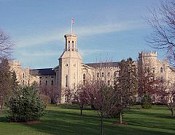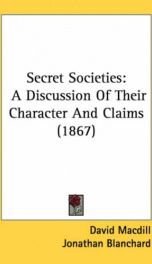Beecher Edward

Jonathan Blanchard (1811–1892) was a pastor, educator, social reformer, abolitionist and the first president of Wheaton College, which was founded in 1860. Blanchard had previously been president of Knox College in Galesburg, Illinois and was a staunch abolitionist with ties to Oberlin College. Blanchard separated the Wheaton College from any denominational support and was responsible for its name, in honor of trustee and benefactor Warren L. Wheaton.[1] Jonathan Blanchard used the school as a platform for his abolitionist ideas and anti-Masonic advocacy, as well as for his national presidential campaign in 1884 on the Anti-Masonic Party ticket. He saw Wheaton College "as an 'arsenal' and 'drill camp' for the hosts of righteousness in the moral warfare of the world . . . a means of training social activists . . . ."[2] Jonathan Blanchard's son, Charles A. Blanchard, succeeded him as college president in 1882 and served Wheaton in that capacity until his death in 1925.[1] Wheaton's most recognizable and oldest building is Blanchard Hall, a limestone tower built as the Central College Building in 1853 and, subsequently, named in honor of the college's first two presidents. Of New England Congregationalist stock, Blanchard had a clear vision for evangelical cooperation in gospel work and social reform. He named the church he cultivated on the campus of Wheaton College "The First Church of Christ in Wheaton." Blanchard insisted that the church go on public record with its opposition to slavery and secret societies and its support for temperance.[3] It was said that, on almost every conceivable political or social issue, Jonathan Blanchard was a reactionary. He was a driving force behind, and the first president of, the National Christian Association, which appeared in the early 1860s, and he worked closely with Charles. G. Finney in opposition to the "insidious influence of [secret] societies." Blanchard and the NCA were determined to, "through tracts, lectures and sermons, introduce those embroiled with orders, both Christian and non, to the freedom promised by Jesus Christ, who performed His ministry not secretly but openly."[4] In 1882, Blanchard was a candidate for the Presidency of the United States on the Anti-Masonic Party ticket. On September 13th of that year, he gave an hour-and-a-half lecture on "Christian Politics" at the anti-Masonic convention. The platform of the anti-Masonic Party was very brief, and espoused christianity, temperance, the abolition of secret societies, and a direct vote for President and Vice-President of the United States instead of an electoral college.[5]
do you like this author?
What readers are saying
What do you think? Write your own comment on this book!
write a commentWhat readers are saying
What do you think? Write your own comment on this author!
write a commentBook list

Secret Societies
A Discussion of Their Character and Claims
Series:
Unknown
Year:
Unknown
Raiting:
3.5/5
Show more
add to favoritesadd In favorites

the papal conspiracy exposed and protestantism defended in the light of reaso
Series:
Unknown
Year:
Unknown
Raiting:
2.5/5
Show more
add to favoritesadd In favorites

the conflict of ages or the great debate on the moral relations of god and ma
Series:
Unknown
Year:
Unknown
Raiting:
3.5/5
Show more
add to favoritesadd In favorites
Book list

Secret Societies
A Discussion of Their Character and Claims
Series:
Unknown
Year:
Unknown
Raiting:
3.5/5
Show more
add to favoritesadd In favorites

the papal conspiracy exposed and protestantism defended in the light of reaso
Series:
Unknown
Year:
Unknown
Raiting:
2.5/5
Show more
add to favoritesadd In favorites

the conflict of ages or the great debate on the moral relations of god and ma
Series:
Unknown
Year:
Unknown
Raiting:
3.5/5
Show more
add to favoritesadd In favorites

narrative of riots at alton in connection with the death of rev elijah p love
Series:
Unknown
Year:
Unknown
Raiting:
2.5/5
Show more
add to favoritesadd In favorites

narrative of riots at alton in connection with the death of rev elijah p lov
Series:
Unknown
Year:
Unknown
Raiting:
3/5
Show more
add to favoritesadd In favorites

Secret Societies
Series:
Unknown
Year:
Unknown
Raiting:
2.5/5
An inquiry of secret societies by Edward Beecher, a noted theologian of the nineteenth century, in co-authorship with Jonathan Blanchard and Rev. David MacDill. The authors’ aid was evidently to prove evil nature of such communities, using the Bible quotations.
Show more
add to favoritesadd In favorites
What readers are saying
What do you think? Write your own comment on this author!
write a commentif you like Beecher Edward try:
readers also enjoyed
What readers are saying
What do you think? Write your own comment on this author!
write a commentGenre
if you like Beecher Edward try:
readers also enjoyed
Do you want to exchange books? It’s EASY!
Get registered and find other users who want to give their favourite books to good hands!

